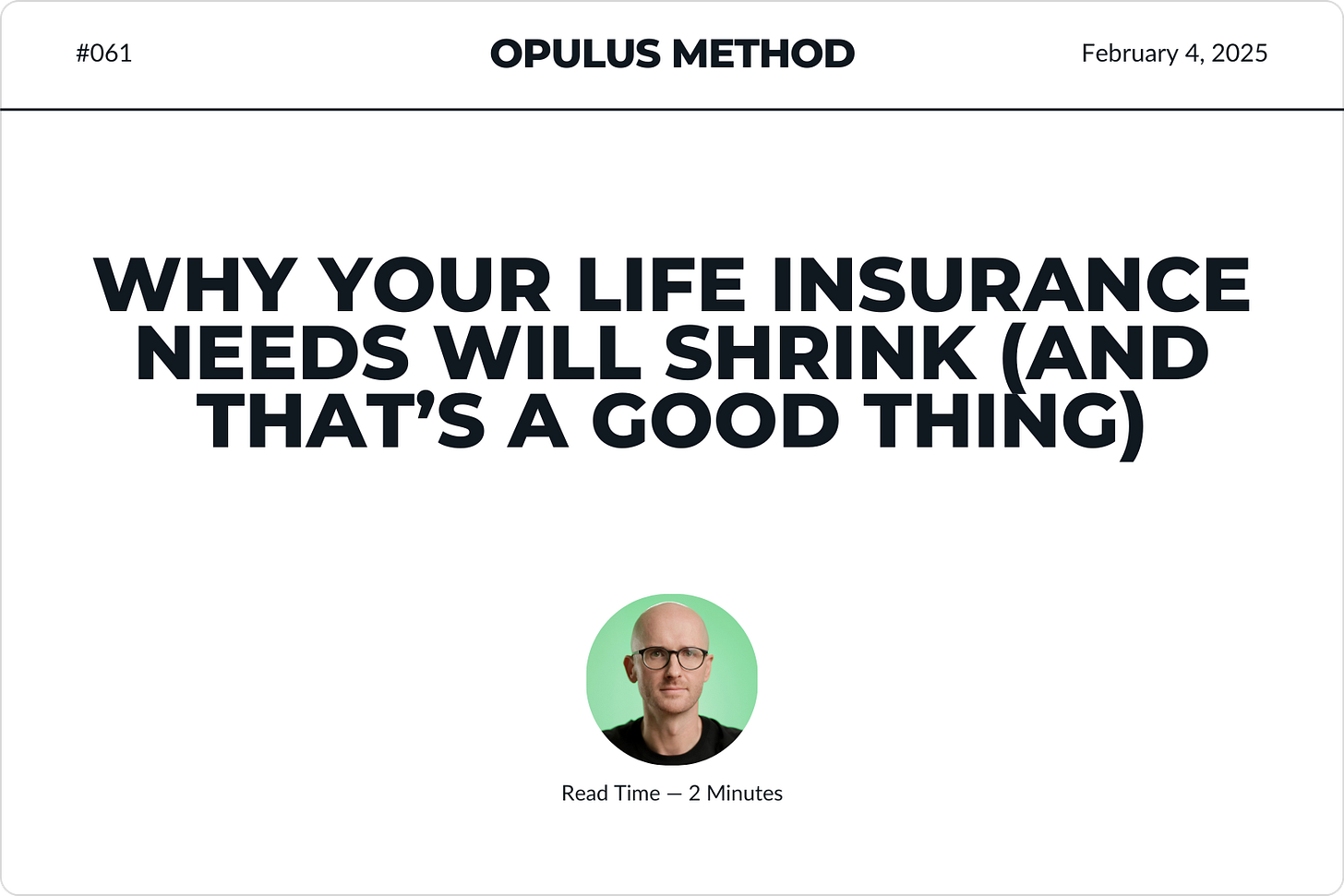Why Your Life Insurance Needs Will Shrink (And That’s a Good Thing)
Inside look at what the insurance industry doesn't want you to know about coverage.
Most people are overpaying for life insurance.
After watching hundreds of agents at my former agency push expensive policies, I'll tell you the truth about what actually works. Most people don't need lifelong coverage — and the industry doesn't want you to know that.
Not exactly what they taught us in sales training.
But here's the thing: Life insurance is not meant to be a lifetime commitment. It's more like a bridge that protects your family while you're building wealth.
Once you've crossed that bridge? You can let it go.
Today we’re going to cover 4 things:
Stop Overpaying for Permanent Coverage
Don’t Fall for the “Infinite Banking” Fairy Tale
Question That “Forever” Coverage
Create Your Strategic Insurance Reduction Plan
Let's break it down.
↓
1. Stop Overpaying for Permanent Coverage
Here's the truth: It’s not uncommon to see people dropping $750/month on permanent life insurance when they could get the same protection for $50/month with term coverage.
Think about that for a second.
That's $700 every single month you could be investing or using to boost your quality of life. At a 8% return over 20 years? You're looking at an extra $450,000 in your pocket.
And let's be honest — isn't that a better use of your money than paying premiums until you're 100?
2. Don't Fall for the "Infinite Banking" Fairy Tale
I've reviewed hundreds of permanent life insurance policies, and I'll tell you what they don't mention in the sales pitch: The returns barely beat a savings account.
Those fancy presentations about "being your own banker" and "tax-free growth" sound amazing in theory. And look even better on the illustrations.
But in reality? I never saw a single client of the agency successfully execute these strategies.
3. Question That "Forever" Coverage
Here's something the insurance industry doesn't want you to think about: Your $2M coverage needs today probably won't be your needs in 20 years.
Why? Because life changes.
Your net worth grows
Your mortgage shrinks.
Your kids become independent.
Your need for life insurance naturally decreases as your wealth increases. But most people keep paying those huge premiums anyway.
Don't be most people.
4. Create Your Strategic Insurance Reduction Plan
Here's what actually works: Match your coverage to specific life milestones. Think of it like a reverse ladder:
Mortgage paid off? Drop that portion of coverage
Kids through college? Reduce again
Retirement gap closed? You might not need any coverage at all
Each time you hit one of these milestones, you're one step closer to being self-insured. And that's the ultimate goal.
That's it.
Look, I get it. The insurance industry has done a fantastic job making us think we need expensive, permanent coverage "just to be safe." But sometimes the smartest financial moves are the simplest ones.
Buy term coverage that matches your temporary needs.
Invest the difference.
Reduce coverage as your wealth grows.
That's it. That's the secret sauce to protecting your family while building serious wealth.
Thanks for reading. See you next week.
Whenever you're ready, there are 2 other ways we can help you:
Opulus Method Digital Course: Join 350+ students inside the Opulus Method. In just 90 minutes, learn a proven system to secure your financial freedom without sacrificing your lifestyle.
Join Opulus as a Client: We'll build your personalized strategy to reduce taxes, boost your income, and grow your wealth. Live life on your terms—we'll execute the financial strategy to get you there.
Opulus, LLC (“Opulus”) is a registered investment advisor in Pennsylvania and other jurisdictions where exempted. Registration as an investment advisor does not imply any specific level of skill or training.
The content of this newsletter is for informational purposes only and does not constitute financial, tax, legal, or accounting advice. It is not an offer or solicitation to buy or sell any securities or investments, nor does it endorse any specific company, security, or investment strategy. Readers should not rely on this content as the sole basis for any investment or financial decisions.
Past performance is not indicative of future results. Investing involves risks, including the potential loss of principal. There is no guarantee that any investment strategies discussed will result in profits or avoid losses.
All information is provided "as-is" without any warranties, express or implied. Opulus does not warrant the accuracy, completeness, or reliability of the information presented. Opinions expressed are those of the authors, Ryan Greiser and Francis Walsh, and are subject to change without notice.
Opulus is not responsible for any errors or omissions, nor for any direct, indirect, or consequential damages resulting from the use or reliance on this information. Use of the content is at your own risk. This content is not intended as an offer or solicitation in any jurisdiction where such an offer or solicitation would be illegal.






